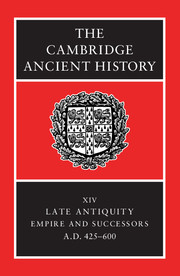Book contents
- Frontmatter
- PART I CHRONOLOGICAL OVERVIEW
- 1 The western empire, 425–76
- 2 The eastern empire: Theodosius to Anastasius
- 3 Justin I and Justinian
- 4 The successors of Justinian
- 5 The western kingdoms
- PART II GOVERNMENT AND INSTITUTIONS
- PART III EAST AND WEST: ECONOMY AND SOCIETY
- PART IV THE PROVINCES AND THE NON-ROMAN WORLD
- PART V RELIGION AND CULTURE
- Conclusion
- Chronological Table
- BIBLIOGRAPHY
- Index
- References
3 - Justin I and Justinian
from PART I - CHRONOLOGICAL OVERVIEW
Published online by Cambridge University Press: 28 March 2008
- Frontmatter
- PART I CHRONOLOGICAL OVERVIEW
- 1 The western empire, 425–76
- 2 The eastern empire: Theodosius to Anastasius
- 3 Justin I and Justinian
- 4 The successors of Justinian
- 5 The western kingdoms
- PART II GOVERNMENT AND INSTITUTIONS
- PART III EAST AND WEST: ECONOMY AND SOCIETY
- PART IV THE PROVINCES AND THE NON-ROMAN WORLD
- PART V RELIGION AND CULTURE
- Conclusion
- Chronological Table
- BIBLIOGRAPHY
- Index
- References
Summary
JUSTIN I (518–27)
For understandable reasons the reign of Justin I tends to be eclipsed by that of Justinian, his nephew and successor (527–65). Not only was Justinian already a powerful figure during his uncle’s reign, but Procopius of Caesarea, the leading historian of Justinian, regarded his rule as effectively including that period. In view of their common background and the continuity of imperial policy in certain areas, Justin’s reign is often associated with that of Justinian in modern accounts. Although Anastasius had three nephews, Hypatius, Pompeius and Probus, there was no designated successor when he died in 518. As magister militum per Orientem, Hypatius was away from Constantinople, and Justin, then the head of the excubitors (the palace guard), is said to have used cash destined for the support of another candidate to bribe his troops to support his own name; as a result, on 10 July 518 he was proclaimed by the senate, army and people and then crowned by the patriarch.
The new emperor was already elderly and his background was humble. He originated from Latin-speaking Illyricum, having been born at Bederiana, near Naissus (Nis), and he owed his success to his career in the guard. According to Procopius he was illiterate, and in his religious views he was staunchly Chalcedonian. Other contemporaries recorded the arrival of this backward provincial in Constantinople in about 470 and his subsequent success as something at which to marvel, and the story was depicted in art.
- Type
- Chapter
- Information
- The Cambridge Ancient History , pp. 63 - 85Publisher: Cambridge University PressPrint publication year: 2001
References
- 1
- Cited by

